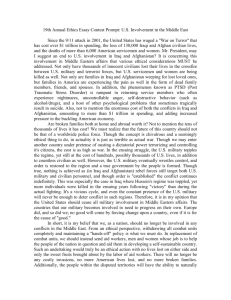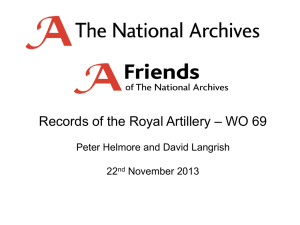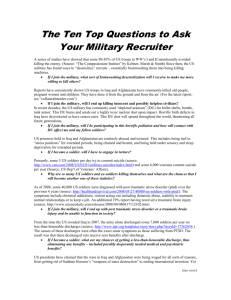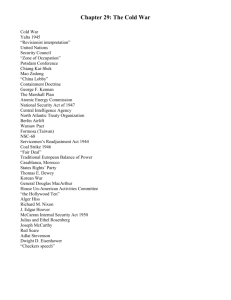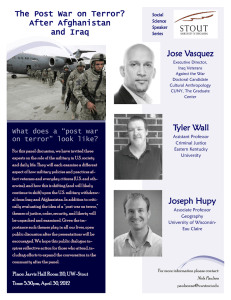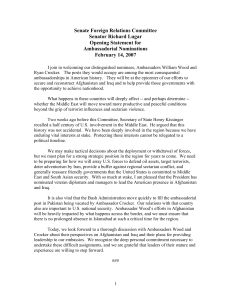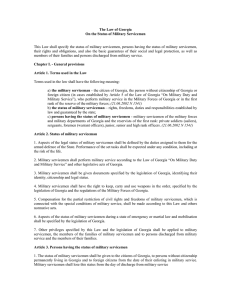! " # $ " %
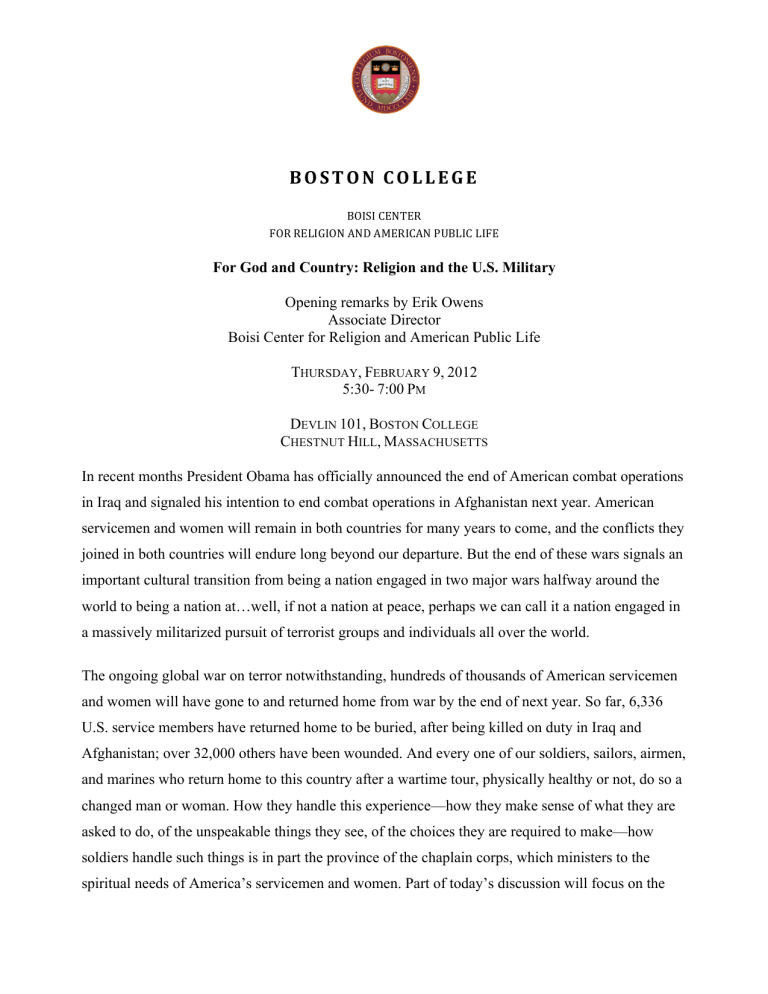
!
! " # $ " % & ' " ( ( ) * ) &
"#$%$!&'()'*!
!
+#*!*',$-$#(!.(/!.0'*$&.(!12",$&!,$+'
!
For God and Country: Religion and the U.S. Military
Opening remarks by Erik Owens
Associate Director
Boisi Center for Religion and American Public Life
T HURSDAY , F EBRUARY 9, 2012
5:307:00 P
M
D
EVLIN
101, B
OSTON
C
OLLEGE
C
HESTNUT
H
ILL
, M
ASSACHUSETTS
In recent months President Obama has officially announced the end of American combat operations in Iraq and signaled his intention to end combat operations in Afghanistan next year. American servicemen and women will remain in both countries for many years to come, and the conflicts they joined in both countries will endure long beyond our departure. But the end of these wars signals an important cultural transition from being a nation engaged in two major wars halfway around the world to being a nation at…well, if not a nation at peace, perhaps we can call it a nation engaged in a massively militarized pursuit of terrorist groups and individuals all over the world.
The ongoing global war on terror notwithstanding, hundreds of thousands of American servicemen and women will have gone to and returned home from war by the end of next year. So far, 6,336
U.S. service members have returned home to be buried, after being killed on duty in Iraq and
Afghanistan; over 32,000 others have been wounded. And every one of our soldiers, sailors, airmen, and marines who return home to this country after a wartime tour, physically healthy or not, do so a changed man or woman. How they handle this experience—how they make sense of what they are asked to do, of the unspeakable things they see, of the choices they are required to make—how soldiers handle such things is in part the province of the chaplain corps, which ministers to the spiritual needs of America’s servicemen and women. Part of today’s discussion will focus on the
role of religion in the U.S. Military, as experienced by the servicemen and women and the chaplains who minister to them.
But we will also be looking at the broader cultural resonance of the large-scale return of Americans from the battlefield to the American homeland. For at least the past hundred years, Americans have invested the American soldier with a deep religious significance connected to heroism, purity of sacrifice, and devotion to the nation. But the soldiers themselves have not always seen things the same way. From Charles Whittlesey in the Great War to Pat Tillman in Afghanistan, military servicemen and women have frequently reconfigured or contested the religious perspectives cast upon them by civilians, even as they struggle to make sense of their own experience in religious terms. However novel our present situation is, it is also another chapter in the long and complicated relationship between the military and civilian cultures in our country.
The Boisi Center is delighted to bring together today two men with unique scholarly, military, and religious experiences to wrestle with these broad questions and important themes. I’ll introduce them in the order they will speak.
The Boisi Center is delighted to bring together today two men with unique scholarly, military and religious experiences to wrestle with these broad and important themes. I’ll introduce them in the order they will speak.
Jonathan Ebel is Assistant (soon to be Associate!) Professor of Religion at the University of
Illinois at Urbana-Champaign and former Lieutenant Commander in the U.S. Navy and Navy
Reserve. His research focuses on religion and war, religion and violence, and lay theologies of economic hardship. Professor Ebel is author of Faith in the Fight: Religion and the
American Soldier in the Great War (Princeton, 2010) and co-editor of From Jeremiad to Jihad:
Religion, Violence and America (California, June 2012). His next book, from Yale press in 2013(?) is called G.I. Messiah: Soldiers, War and American Civil Religion . He received an A.B. from
Harvard University and an M.A. and Ph.D. from the University of Chicago.
2
Fr. Richard Erikson is a chaplain and colonel in the United States Air Force (USAF) Reserve, and mobilization assistant to the Deputy Chief of Chaplains in the USAF. He, too, is up for promotion –
President Obama recently recommended him for promotion to Brigadier General, pending
Congressional approval. From 2006-2011 Fr. Erikson served as Vicar General and Moderator of the
Curia of the Catholic Archdiocese of Boston. He has served in the USAF Reserve for 29 years, including seven years as an active duty chaplain, with a tour in Iraq in 2004. He holds an M.A. in
Theology from St. John's Seminary, and an M.A. and Ph.D. in sociology from the University of
Southern California.
Each speaker will have up to 20 minutes for their remarks; the remaining 40 minutes or so will be given over to conversation with you, the audience.
3
